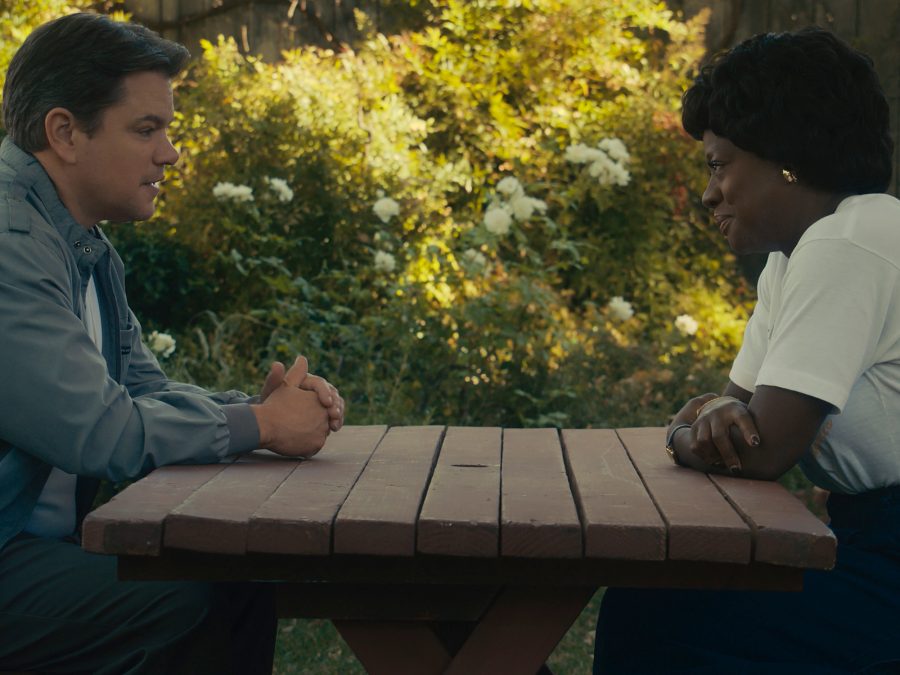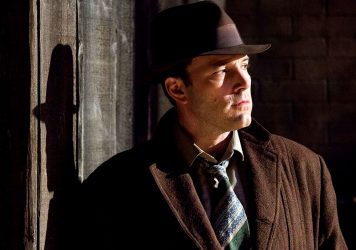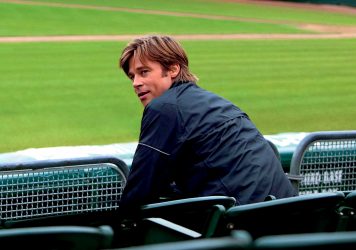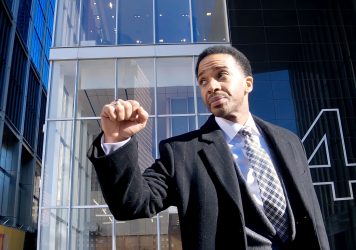Ben Affleck returns to the director's chair, fictionalising the fascinating story of how an iconic shoe was born.
It feels important to note that Ben Affleck’s latest directorial effort is not really about Michael Jordan, the greatest basketball player – and quite possibly the greatest athlete – of all time. It’s not even really a movie about shoes. Rather, Air, which fictionalises the conception of Nike’s flagship sneaker line in 1984 and the play the company made to sign Jordan to an endorsement deal, is a film about personal excellence and perseverance.
This is a theme that Affleck has chased throughout his filmmaking career, from Gone Baby Gone through to Live By Night (and Good Will Hunting, if you go back even further). He is drawn to resilient, maverick protagonists, whether they’re cops, criminals, CIA agents, or in the case of Air, corporate bods like Nike basketball scout Sonny Vaccaro (Matt Damon) whose passion for his work is matched only by his reluctance to play by the rules. It’s a quintessentially American sentiment – even when the individual works as part of a larger group or team, their solo greatness is a defining feature.
Much is made within the film of Michael Jordan’s greatness. As the film opens, Jordan is 21-years-old and the third overall pick in the 1984 NBA draft. He’s in his rookie season with the Chicago Bulls, a star-in-the-making, but not quite in the stratosphere. While pouring over Jordan’s game footage in hopes of pitching a player with the power to turn Nike’s fortunes in the basketball business around – at the time, they were trailing behind Converse and Adidas by a considerable margin – Vaccaro realises it’s not just talent that Jordan possesses. It’s magic.
As the film tells it, plenty of other people, including the teams at Converse and Adidas, recognised Jordan’s talent, but there’s only one other person besides Vaccaro who truly foresaw his trajectory. His mother Deloris, played here by Viola Davis, is Jordan’s advocate, approaching her son’s career with a calm perspicuity, unfazed by corporate razzle dazzle. She wants what will best serve her son’s interests, and safeguard not only his financial future, but his personal legacy.
Jordan himself is a phantom. He speaks only a handful of words, and is only ever shot from behind – this does ensure the film’s scope is laser-focused on what is realistically a small chapter in the athlete’s life, but it does feel a little strange to only see a character’s thoughts and feelings relayed through those around him when the whole narrative rests on his shoulders. Given we already know how the story ends (Jordan signs the deal, the Air Jordan becomes possibly the most well-known sneaker in the world) perhaps this is Affleck and screenwriter Alex Convery’s method of not condescending to an already invested audience, but it does feel like a convenient way of avoiding the tricky task of characterising a legend.
The most we see of Jordan is during the crucial meeting between his family and the Nike team. When Vaccaro suspects he’s losing Jordan’s interest, he recalls advice given to him by best friend and basketball legend George Raveling (Marlon Wayans), relaid through an anecdote about watching Martin Luther King improvise the I Have A Dream speech. Inspired by Raveling’s recollection of this pivotal moment, Vaccaro tells Jordan his future: the highs and lows, the tabloid muckraking and the level of greatness to which he will finally ascend. His rousing monologue is intercut with real-life newspaper clippings from Jordan’s career, illustrating that Vaccaro is correct, in a charismatic display of Hollywood mythmaking. We know this is categorically not how it went down, but in this moment, Vaccaro displays a parallel greatness to Jordan. He convinces him to take the deal.

Air does at least seem wryly aware of the strained relationship between creativity and capitalism. Repeatedly characters butt heads over the risks in Vaccaro’s ambitious strategy, with Nike CEO Phil Knight – Affleck on charming form as the Buddhist aphorism-spouting, purple leggings-sporting Cool Boss – relaying that the company can’t afford to put a foot wrong since he took it public. Having grown his sneaker business from a scrappy car-boot operation to a billion-dollar organisation, Knight seems to long for his more cavalier past while locked away in his impressive office. It’s a goofy but charming performance from Affleck, and undoubtedly an affectionate one (a title card at the end points out Knight has donated a whole $2 billion of his $41.5 billion fortune to charity).
Meanwhile, in opening the film with Dire Straits’ Money for Nothing – a song about the comparably easy life of the rich and famous compared to blue collar workers – over a montage of the most memorable advertisements and products that developed during the age of “Greed is Good”, Affleck demonstrates a little awareness that pitting a mega corporation like Nike as the underdog is preposterous. Underscoring this is a delightful exchange between Vaccaro and harried Nike marketing bod Rob Strasser (Jason Bateman on Michael Bluth-esque form) in which Strasser reflects on the moment he realised Bruce Springsteen’s ‘Born in the U.S.A’ is not a patriotic anthem, but rather a bleak reflection on a working class man who returns from the Vietnam War alienated and isolated.
This little aside acts as a parallel for the exploitation of art and artists by capitalism – a thread that appears when Deloris stipulates that her son should receive a percentage of the gross revenue from every pair of Nike shoes sold. There’s some irony in the fact that Air is an Amazon film, considering the company is frequently at the heart of labour disputes, but this point at least – that the worker’s power lies with knowing their worth – rings true. And in order to leverage this power, workers must stand together. While Vaccaro is talented, he’s only able to realise his scheme with the support of his colleagues: Howard White (a delightful Chris Tucker) and shoe designer Peter Moore (the underrated Matthew Maher) as well as Knight and Strasser.
By no means is Air a radical film, but it does manage to pack a lot into its runtime, all while maintaining a feather-light pace and snappy sense of humour. To wit, Affleck and his team nail the casting – while his on-screen reunion with Damon is a delight, it’s just as rewarding to see Damon and Davis share scenes, and Chris Messina is a scene-stealer as the foul-mouthed ace agent David Falk. At a point in Hollywood where casting relies more on algorithms and Instagram followers than actual chemistry, Air demonstrates the importance of that on-screen alchemy that can’t be predetermined by a computer.
So it’s not the Michael Jordan story, or a two-hour lesson about the science of sneaker design. Instead Air is an engaging Hollywood fairytale, about extraordinary people and the scope of their ambition, and the importance of advocating not only for your own worth, but for the worth of those around you. To basketball, and specifically to Jordan, it assigns a sort of mythological status – reflecting the sport’s obsession with statistics and numbers that runs parallel to something less tangible: a feeling that develops when we see greatness before us. It’s what you’re prepared to do to nurture that feeling – particularly in a world rife with exploitation and opposition – that matters most.
Little White Lies is committed to championing great movies and the talented people who make them.
Published 6 Apr 2023
How interesting can a shoe origin story really be?
Quite interesting, actually – and funny.
An energetic take on an iconic sneaker – if not the icon himself.

Ben Affleck directs and stars in this sprawling, ambitious and flawed east coast gangster epic.

By Dan Stewart
Bennett Miller and Aaron Sorkin combine for the best film about statistics you’re ever likely to see.

André Holland plays a sports agent who takes on the NBA in this quietly radical drama from Steven Soderbergh.